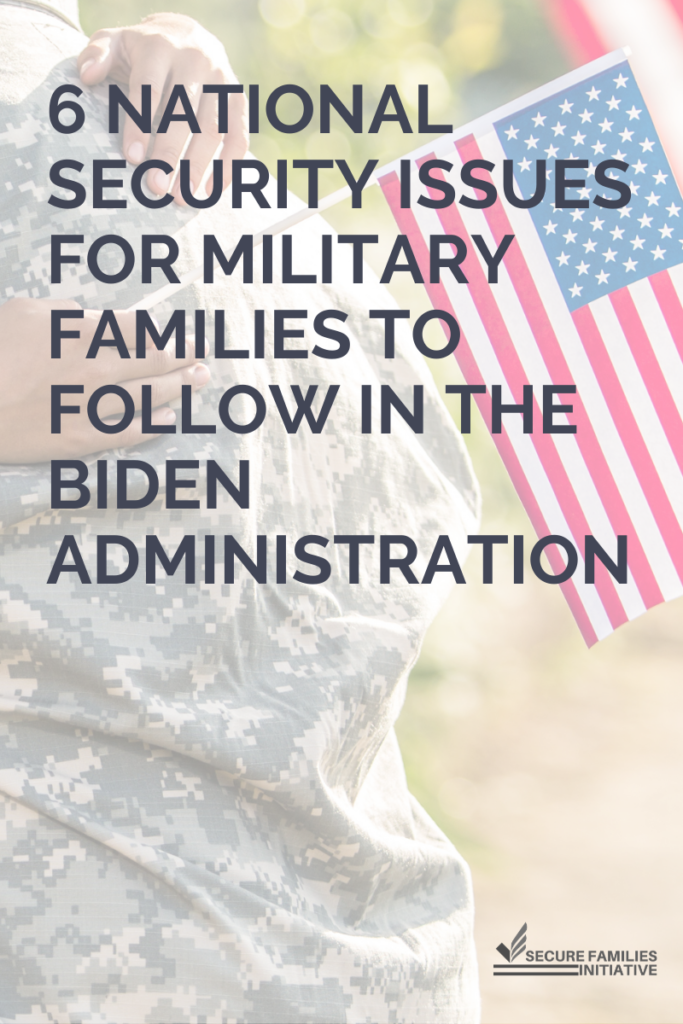By: Janessa Schilmoeller.
2020 has been filled with unexpected challenges, and the recent election cycle was no different. This election was especially difficult for members of our military community who went to great lengths to have their votes counted. Despite the challenges of voting during a global pandemic, the United States saw record turnout, with Joe Biden winning more votes than any Presidential candidate in U.S. history.
With the anxiety of Election Day behind us, the Secure Families Initiative is preparing for what lies ahead. At SFI, we are committed to promoting foreign policy decisions that prioritize peace and diplomacy while elevating the voices of military families in the process. Check out the top national security issues affecting military families that we’ll be monitoring under the Biden administration.

Troop Withdrawal from Afghanistan
It’s hard to believe that after nearly 20 years, U.S. leadership is still struggling to bring home our troops from Afghanistan. The United States is actively supporting intra-Afghani negotiations between Kabul and the Taliban in hopes of ending the longest war in U.S. history.
President Trump announced this month that he would expedite the withdrawal of approximately 2,500 troops collectively from Afghanistan, Iraq, and Somalia before his term ends in January 2021. Some experts warn the move is premature and could undermine counterterrorism efforts.
Military families want our service members to come home as quickly as possible, and also recognize that any withdrawal must be done safely, with proper coordination and timing to ensure no harm is done to troops and allies remaining in the region.
What can we expect from the Biden administration? Like previous presidents, Biden has vowed to end U.S. involvement in “forever wars” in Afghanistan and across the Middle East. Under the Biden administration, we anticipate:
- The withdrawal of troops from Afghanistan and Iraq under negotiated terms
- An end to U.S. support for Saudi Arabia’s war in Yemen
- A small remaining troop contingency focused on ISIS and Al-Qaeda
The Iran Nuclear Program
It’s been nearly a year since the United States found itself on the brink of war with Iran. Following months of escalations under Trump’s maximum pressure campaign, and Iran’s increased uranium enrichment and proxy attacks in the region, the United States launched an airstrike last January that killed Iranian General Qassem Soleimani.
Military families remember the agony of watching from home as Iran retaliated by launching ballistic missiles at bases housing U.S. troops in Iraq, which left nearly 100 service members with Traumatic Brain Injuries (TBIs).
Fast forward to earlier this month, when President Trump asked senior advisors for options to launch a potential military strike on Iranian nuclear targets before the end of his term. Needless to say, tensions between the two countries remain high.
What can we expect from the Biden administration? While President Trump withdrew from the JCPOA (also known as the Iran nuclear deal) in 2018, Biden said he is open to rejoining the Obama-era agreement under certain conditions. Under the Biden administration, we expect to see:
- An attempt to rejoin the JCPOA if Iran returns to compliance
- A strong-handed diplomatic approach to counter Iran’s destabilizing proxy conflicts and human rights violations
- Emphasis on multilateral support from key allies in Europe and Asia
Domestic Terrorism & White Supremacy
According to a recent report by the Department of Homeland Security, domestic white supremacist extremists pose the greatest terrorist threat to the United States. The report showed that attacks by white supremacists were responsible for 39 out of 48 total deaths caused by terrorist attacks in the United States between 2018-2019.
The military has long been a recruiting ground for domestic terrorists. Veterans have gone on to hold key leadership positions in white supremacist and anti-government extremist organizations. Even among active duty service members, the Department of Defense recorded at least 27 instances of extremist activity between 2013-2018.
Surprisingly, being a member of a white supremacist group is not grounds for immediate dismissal from the military. The Southern Poverty Law Center, which has been tracking white supremacy in the military since 1986, reported that the National Defense Authorization Act (NDAA) was actually amended last year to remove white nationalism from the screening criteria for recruits.
What can we expect from the Biden administration? President-elect Biden has accused the Trump administration of fueling white supremacy and racism in the United States. According to the 2020 Democratic Party Platform, the Biden administration will:
- End racial and religious profiling by law enforcement agencies
- Strengthen hate crimes legislation
- Combat domestic terrorism with the support of law enforcement

Climate Change
Since 2010, the Department of Defense has warned of the security threat posed by climate change. The effects of climate change threaten the stability of military installations, lead to increased refugee and humanitarian crises, and could spur regional conflicts and instability around the world.
When climate emergencies uproot military installations, service members and their families pay the price. Hundreds of military families were displaced when Hurricane Michael ripped through Tyndall Air Force Base in 2018.
A 2019 DoD report detailing climate threats focused on 79 key installations vulnerable to the effects of climate change. Of the selected installations at risk of flooding, desertification, droughts, wildfires, and thawing permafrost, at least two-thirds are already experiencing current effects.
What can we expect from the Biden administration? Climate change is a top priority of the Biden administration. John Kerry was just announced as the President-elect’s special envoy on climate. According to Biden’s climate plan, we expect the next administration to:
- Make climate change a core focus of policy and operational national security plans
- Rejoin the Paris Climate Accord on his first day in office
- Increase diplomatic pressure on other countries to adhere to, and also increase, their commitments to reduce net carbon emissions by 2050
- Pressure China to eliminate subsidies on coal and stop pollution-heavy fossil-fuel energy projects that are included in their Belt and Road initiative
Missile Threat in North Korea
Four years ago, President Obama advised then President-elect Trump that North Korea would be a critical national security threat for his administration. President Trump seemed to heed the warning, and managed to broker the first-ever meeting between the leaders of North Korea and the United States in 2018.
Unfortunately, the historic meetings between the two presidents have done little to curb North Korea’s missile expansion, and Trump has been criticized for legitimizing Kim Jong Un’s military behavior. Just last month, North Korea unveiled an intercontinental ballistic missile capable of reaching across the continental United States.
There are close to 100,000 U.S. troops stationed across South Korea, Japan, and Guam, not including the tens of thousands of families accompanying them, all of whom find themselves in range of North Korean missiles.
What do we expect from the Biden administration? With the change in administrations, North Korea might ramp up weapons testing to escalate tensions. We can expect Biden to approach North Korea with:
- A multilateral approach with key allies in South Korea and Japan
- A coordinated campaign that draws in support from China to pressure North Korea
- Negotiations that prioritize conditions of denuclearization in North Korea
War Powers
Behind the ability of any Commander-in-Chief to intervene militarily on matters of national security are limits laid out by constitutional war powers. The Constitution leaves the authority to declare war in the hands of Congress. However, following the terrorist attacks of 9/11, Congress passed the 2001 and 2002 Authorizations for Use of Military Force (AUMFs), which delegated more war-fighting authority to the Executive Branch. These AUMFs have been used to justify far-reaching counterterrorism operations around the world without a formal declaration of war.
Bipartisan legislation was passed in 2020 with hopes of limiting the President’s ability to intervene militarily in Iran. Unfortunately, the bill did not survive President Trump’s veto.
War powers are an important issue for military spouses, who have to deal with the heavy consequences of routine deployment surges. That’s why we believe decisions to send our service members into harm’s way should be made judiciously with full transparency of the law.
What can we expect from the Biden administration? President-elect Biden has indicated that he is willing to limit war powers. We expect the Biden administration to:
- Work with Congress to roll back outdated authorizations on the use of military force
- Implement a more targeted and limited framework that specifies the use of force to protect from terrorist threats
- Commit to ending long-standing wars in the Middle East

Diplomacy is the Best Defense
Our number one priority under any administration is to push for foreign policy decisions that prioritize diplomacy over military conflict. We hope the Biden administration will invest in diplomacy as the best defense against future wars. To read more about Biden’s approach to national security, read his plan for strengthening global leadership.
Which national security issues are you tracking under the next administration? Fill out the SFI end-of-year survey and tell us which policy issues are most important to your family. Sign up for our newsletter to get updates on how to advocate for smarter foreign policy with us in 2021.
Janessa Schilmoeller is a global educator and content writer who specializes in articles and blogs spanning foreign affairs to social justice education. Connect with her on LinkedIn to learn how she can translate your vision into digestible content that resonates with your audience.


